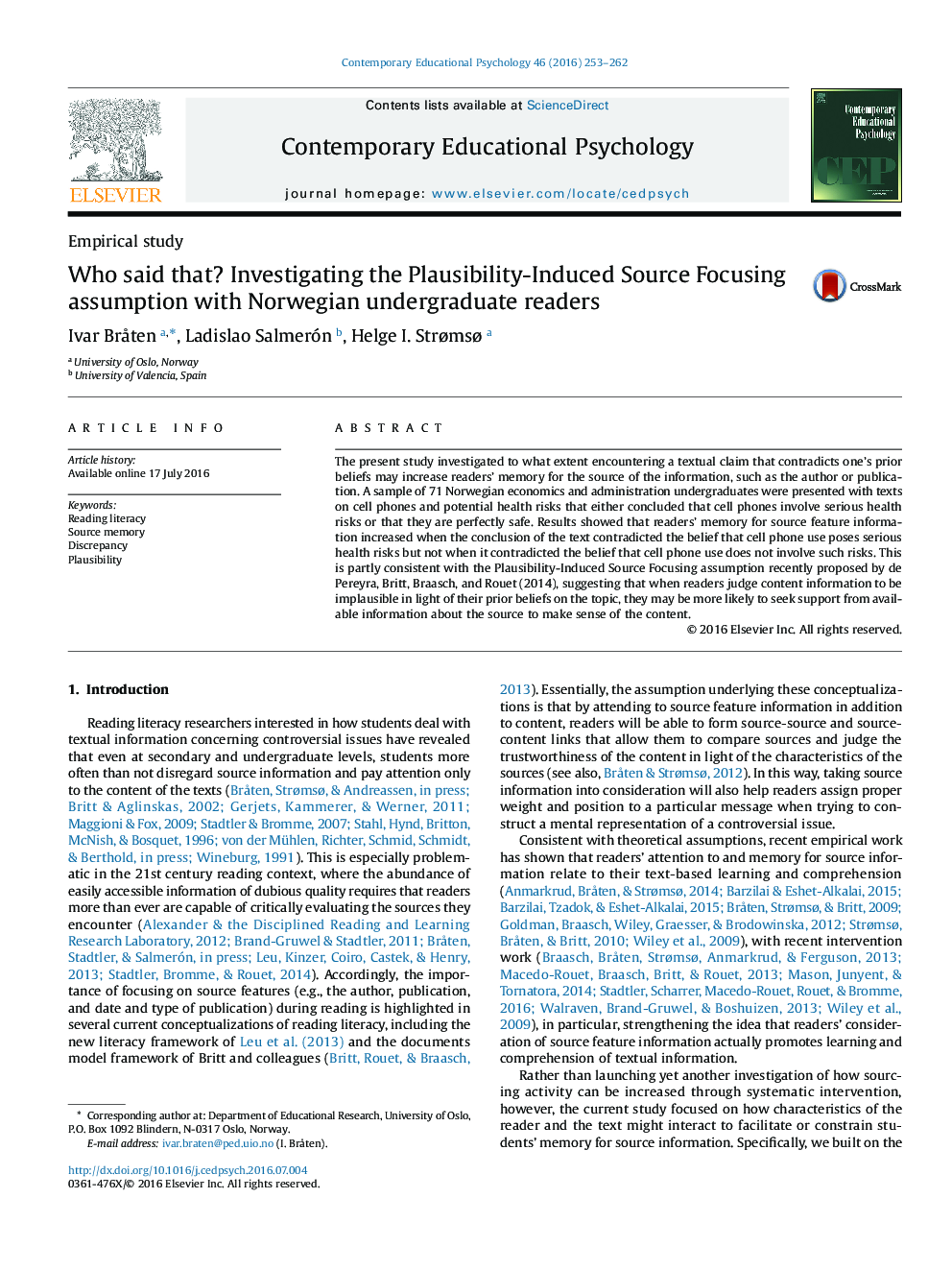| کد مقاله | کد نشریه | سال انتشار | مقاله انگلیسی | نسخه تمام متن |
|---|---|---|---|---|
| 6839822 | 618597 | 2016 | 10 صفحه PDF | دانلود رایگان |
عنوان انگلیسی مقاله ISI
Who said that? Investigating the Plausibility-Induced Source Focusing assumption with Norwegian undergraduate readers
ترجمه فارسی عنوان
کی آن حرف را زد؟ بررسی فرض تمرکز منبع قابل اعتماد با خوانندگان دوره کارشناسی نروژی
دانلود مقاله + سفارش ترجمه
دانلود مقاله ISI انگلیسی
رایگان برای ایرانیان
کلمات کلیدی
سواد خواندن، حافظه منبع، اختلاف، قابل اعتماد بودن،
ترجمه چکیده
در این مطالعه بررسی شده است که تا چه حد با ادعای متنی که با عقاید قبلی مخالف است، ممکن است حافظه خوانندگان را برای منبع اطلاعات مانند نویسنده یا انتشار افزایش دهد. نمونه ای از 71 دانشجوی کارشناسی ارشد اقتصاد و مدیریت نروژی با متون مربوط به تلفن های همراه و خطرات بالقوه سلامتی ارائه شده است که یا نتیجه گیری می کند که تلفن های همراه شامل خطرات جدی بهداشتی و یا کاملا امن هستند. نتایج نشان داد که حافظه خوانندگان برای اطلاعات ویژگی منبع، وقتی که نتیجه متن را متناقض با این باور بود که استفاده از تلفن همراه، خطرات جدی سلامت را ایجاد می کند، اما زمانی که با اعتقاد به اینکه استفاده از تلفن همراه چنین خطراتی را شامل نمی شود، تناقض دارد. این امر تا حدی منطبق با فرض فروپاشی منبع تمرکز پذیری است که اخیرا توسط دپریرا، بریت، براش و روت (2014) پیشنهاد شده است، و پیشنهاد می کند که وقتی خوانندگان اطلاعات محتوا را با توجه به باور قبلی خود در مورد این موضوع قضاوت کنند، ممکن است به احتمال زیاد به دنبال پشتیبانی از اطلاعات موجود در مورد منبع برای حس محتوای است.
موضوعات مرتبط
علوم انسانی و اجتماعی
روانشناسی
روان شناسی کاربردی
چکیده انگلیسی
The present study investigated to what extent encountering a textual claim that contradicts one's prior beliefs may increase readers' memory for the source of the information, such as the author or publication. A sample of 71 Norwegian economics and administration undergraduates were presented with texts on cell phones and potential health risks that either concluded that cell phones involve serious health risks or that they are perfectly safe. Results showed that readers' memory for source feature information increased when the conclusion of the text contradicted the belief that cell phone use poses serious health risks but not when it contradicted the belief that cell phone use does not involve such risks. This is partly consistent with the Plausibility-Induced Source Focusing assumption recently proposed by de Pereyra, Britt, Braasch, and Rouet (2014), suggesting that when readers judge content information to be implausible in light of their prior beliefs on the topic, they may be more likely to seek support from available information about the source to make sense of the content.
ناشر
Database: Elsevier - ScienceDirect (ساینس دایرکت)
Journal: Contemporary Educational Psychology - Volume 46, July 2016, Pages 253-262
Journal: Contemporary Educational Psychology - Volume 46, July 2016, Pages 253-262
نویسندگان
Ivar BrÃ¥ten, Ladislao Salmerón, Helge I. Strømsø,
